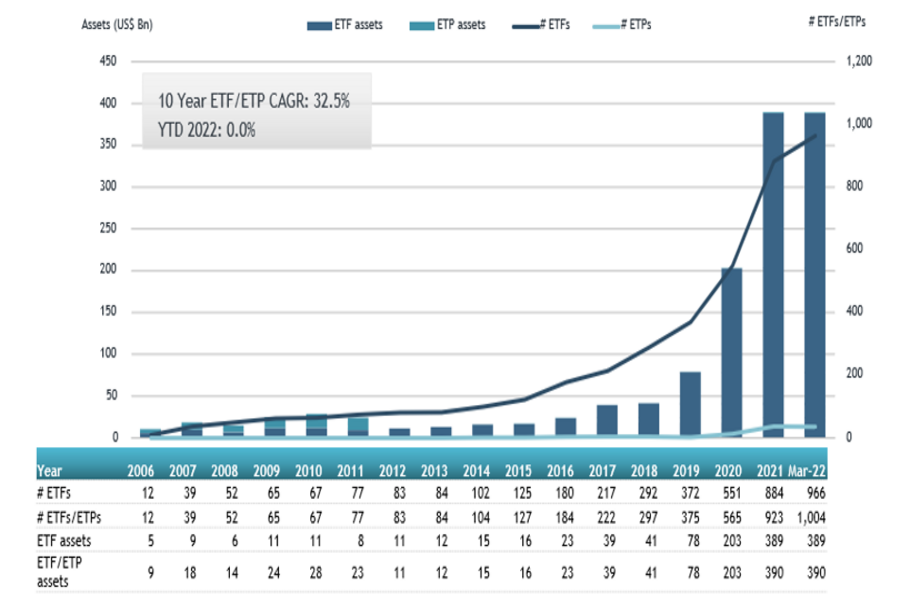

Demand for ESG exchange-traded funds cooled globally during the first quarter of the year, with net flows coming in at less than half of those seen at the beginning of 2021.
Net sales were roughly $24.9 billion, compared with nearly $53.5 billion during the first quarter of 2021, according to data published this week by ETFGI.
That trend was also seen in U.S. fund flows, even as sales were strong both domestic and globally for ESG ETFs, representing the second-highest figures on record.
Nonetheless, the dip in ESG ETF net sales follow a surge in energy stocks that has put many oil-free products at a disadvantage in performance, at least temporarily.
“Many, many people have been tending to put money to work last month into the S&P 500 products. For investors, it’s been getting exposure when they see a buying opportunity,” said Deborah Fuhr, managing partner and founder of ETFGI. “For some investors it is a little bit about performance, but I don’t think that describes it for everyone. For many investors, they see [ESG investing] as something they want to and should do. ESG is very personal. People have very different views.”
Total global assets in ESG ETF and exchange-traded products grew by 3.2% over a year, reaching a high of $390 billion as of the end of March, up from $378 billion a year earlier, according to ETFGI. Over the past 12 months, the products saw a total of $131 billion in net inflows, with March marking the 39th month of consecutive positive sales figures, the research and consulting firm noted.
Global ESG ETF and ETP asset growth as at end of March 2022

Among the top 10 ESG ETF products globally with the highest sales in March, half were iShares products, with the leader being the iShares Global Clean Energy UCITS ETF, which raked in $722 million during the month, followed by the iShares Trust iShares ESG Aware MSCI USA ETF, with $636 million in net new sales.
“It’s not been a record year, but it’s still a strong year for flows,” Fuhr said. “We’re going to continue to see people investing in ESG.”
More traditional products have converted to ESG, and investors are paying more attention to socially responsible investing, as Russia’s war on Ukraine has caused people to think more about energy, weapons manufacturers and agricultural investments, Fuhr said.
Despite strong performance seen in energy markets over the past few months, ESG is not a “boom luxury,” as some investors might see it, said Marina Severinovsky, head of sustainability for North America at Schroders, in a recent interview with ESG Clarity.
“That’s a conflation of what it is we do — actual ESG integration, understanding companies better — versus, there’s a lot of passive where the ESG comes down to being large mega-cap, growth companies in technology and discretionary spaces that don’t have a lot of emissions and employees, so it’s easy to look good,” Severinovsky said. “Those things will sell off … Nothing is always going to outperform, and the more people can be educated, engaged [and have] bought it — it’s aligned with their values, and they understand it — the more they will ride out the waves. Because underneath that is a real structural trend, which is the reallocation of capital.”
Meanwhile, among U.S. mutual funds and ETFs identified by Refinitiv Lipper as being socially responsible investments, total new sales for the first quarter of 2022 were about $9.9 billion, down substantially from the $33.6 billion that flowed into the products during the first quarter of 2021.
While net flows are undoubtedly down, those figures come with a caveat, as many products in early 2021 added ESG language to their prospectuses and were thus suddenly added to the category, Refinitiv Lipper head of research services Tom Roseen said.
So far this year, investors yanked nearly $1.2 billion from actively managed domestic equity ESG funds, while about $2.8 billion funneled into passively managed products in that category, the Refinitiv Lipper data show. Meanwhile, actively managed mixed-asset US ESG funds bled $218 million, while their passive counterparts saw only $4 million in net outflows.
“We had a ‘Tale of Two Cities’ here,” Roseen said. “There was still this ‘active-versus-passive’ thing going on.”
Across asset classes, $5.5 billion in new money poured into passive U.S. ESG funds during the first quarter, while $4.4 billion went into active funds, according to Refinitiv Lipper. During that timeframe last year, the respective figures were $18.5 billion and $15.2 billion.
While flows dipped broadly for ESG funds amid the performance tailwinds for energy holdings, it is apparent that people who are drawn to socially responsible funds tend to hold onto them, Roseen said.
“Even in a flip market, we have noticed there is a stickiness to the conviction of a socially responsible investor,” he said.
Passively managed ESG strategies are gaining ground on active ones, according to investment professionals, as more products have become available and fund providers are able to showcase the benefits that responsible investing can have within index funds.
“It’s very important to clients, so it’s very important to us,” said Steve Norcini, head of sustainable investing at Wilmington Trust, speaking at a panel event on Tuesday. “The active-versus-passive piece is something that comes up frequently when we’re working on portfolio construction.”

AI is no replacement for trusted financial advisors, but it can meaningfully enhance their capabilities as well as the systems they rely on.

Prudential's Jordan Toma is no "Finfluencer," but he is a registered financial advisor with four million social media followers and a message of overcoming personal struggles that's reached kids in 150 school across the US.

GReminders is deepening its integration partnership with a national wealth firm, while Advisor CRM touts a free new meeting tool for RIAs.

The Texas-based former advisor reportedly bilked clients out of millions of dollars, keeping them in the dark with doctored statements and a fake email domain.

The $3.3 trillion tax and spending cut package narrowly got through the upper house, with JD Vance casting the deciding vote to overrule three GOP holdouts.
Orion's Tom Wilson on delivering coordinated, high-touch service in a world where returns alone no longer set you apart.
Barely a decade old, registered index-linked annuities have quickly surged in popularity, thanks to their unique blend of protection and growth potential—an appealing option for investors looking to chart a steadier course through today's choppy market waters, says Myles Lambert, Brighthouse Financial.
